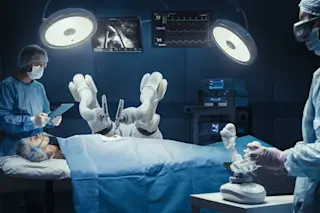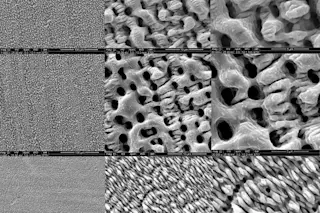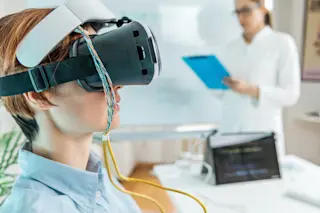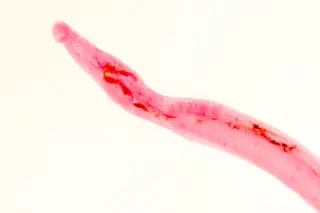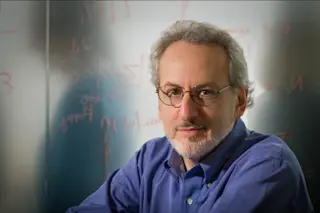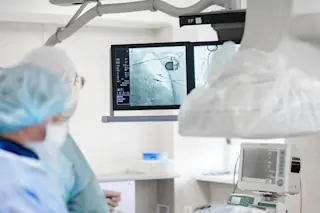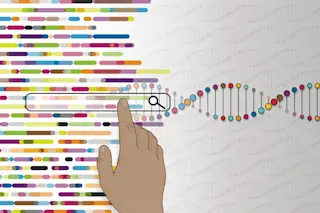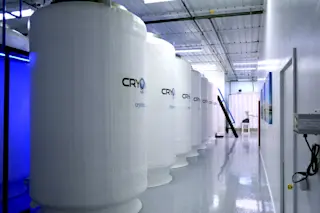Not that long ago, the idea of a robot performing surgery on a human was something out of science fiction. Today, it’s routine. Robotic surgery increased from 1.8 percent to 15 percent of all surgeries from 2012 to 2018, according to the American College of Surgeons.
Today, it’s used for around 22 percent of surgeries, according to several estimates. And no wonder the method is catching on. Robotic surgery (more accurately described as robotic-assisted surgery) offers less bleeding, less time in the hospital, and faster recovery time with less pain.
Easier and Less Painful Surgeries
The “robot” in robotic surgery is actually a very sophisticated machine operated by a highly trained and experienced surgeon. Typically, the surgeon sits at a console and remotely operates robotic arms that hold tiny surgical instruments (yes, the console does look something like a video game controller).
One of the arms holds a camera that gives the surgeon a high-definition, magnified view of the surgical site. Though the surgeon is sitting at a console rather than hunched over the incision, they have a much better view of the surgical field. Using robotics allows surgeons to comfortably maneuver in places that are otherwise quite restrictive, including the pelvis or the left atrium, where the mitral valve is located and where Sloane Guy often works.
“I can drive my camera right into the heart and see exactly where I'm cutting, whereas in an open surgery, I've got to look through a tiny little hole and try to see it,” says Guy, director of minimally invasive and robotic cardiac surgery at the Georgia Heart Institute.
“It’s like eating using a fork and a knife and a spoon versus using chopsticks,” he says. “It just, it gives you more capability and makes the operation easier.”
Read More: How Tiny Bubbles Could Deliver Medication to the Brain
Quicker Surgery Recovery Time
Robotic surgery is easier on the patient, too.
“You don't break open their skeleton. You don't saw their sternum in half. You don't break ribs. You sort of sneak into the chest and fix their problem,” Guy says. “And that translates into faster recovery.”
Surgeons have always prioritized safety and effectiveness, but robotic surgery adds a new element: patient satisfaction. “Quick recovery is important to patients,” he says. Of course, surviving an operation is paramount, and it’s also important that the operation is effective and durable, says Guy. “But it’s important to patients that it doesn't sideline them for a lengthy period of time.”
Guy was a pioneer in the field, gaining experience with the technique in the U.S. Army (robotic surgery grew out of a DARPA project), then going on to start five different robotic surgical programs around the country.
“I got enamored of the robot because I'm kind of a gadget guy,” he recalls. And it’s gadget guys who are taking robotic surgery from fringe to mainstream. Many older surgeons never really embraced the idea of minimally invasive surgery of any kind, much less robotic surgery, says Guy. “But now they’re retiring, and you’ve got a younger generation who grew up with iPhones and video games, and they’re much more open to it.”
The Medical Procedures of Tomorrow
Not only is robotic surgery becoming more widespread, it’s becoming more advanced. Earlier this year, plastic surgeon Victor Chien at Cedars-Sinai in Los Angeles led a team that performed the first robotic microsurgical head and neck cancer reconstructive surgery in the U.S.
The robotic system allowed Chien and his team to operate on blood vessels thinner than a human hair. On the other side of the continent, cardiothoracic surgeon Stephanie H. Chang led a team at New York University Langone in New York that performed the world’s first fully robotic double lung transplant.
Will we one day have robots operating independently? That may not be as far-fetched as it sounds. A team of researchers at Johns Hopkins University has developed an autonomous robot (Smart Tissue Autonomous Robot, or STAR) that has successfully performed abdominal surgeries on pigs — without human help.
“I have no doubt that there will be robots that will do autonomous functions, not the whole operation, but eventually they'll do specific things,” says Guy. “I think of it less as a robot doing someone's procedure and more as a partnership between a human surgeon and a robotic system. It might be able to [do] some things better than the human can do because of its ability to process information much quicker.”
Read More: The Upsetting World of Primitive Brain Surgery
Article Sources
Our writers at Discovermagazine.com use peer-reviewed studies and high-quality sources for our articles, and our editors review for scientific accuracy and editorial standards. Review the sources used below for this article:
Johns Hopkins University HUB. Robot performs first laparoscopic surgery without human help
Annals of Medicine and Surgery. Artificial intelligence: revolutionizing robotic surgery: review
Cedars Sinai. First FDA-Approved Robot-Assisted Microsurgery for Head and Neck Cancer Performed at Cedars-Sinai
American College of Surgeons. Robotic Surgery Is Here to Stay— and So Are Surgeons
University of California San Francisco. Robotic Surgery: Improving Precision and Patient Outcomes



